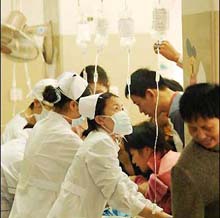Noisy registration offices, long queues, pained and inpatient
people... These are all familiar scenes in Chinese hospitals, its
market-oriented health institutions seldom caring about public
health. Where is the way of China's public health reform?
Market-oriented hospitals do improve medical facilities and are
earning more profits from medicine sales, but also seem to put
public interest aside. Imagine that a doctor, sitting in front of a
patient and asking questions, does not really care about the
patient's health, but is contemplating how to sell their medicines
and how to make money.
Medicare, as an essential cog in the social security engine,
cannot fully depend on individual resources since it is a kind of
social welfare. People complain that medical costs are soaring too
quickly and the ratio of individual expense is so high as to be
unbearable.
Statistics show that about 70 percent of people in China do not
have any medical insurance and even those with insurance still
shoulder 30 to 40 percent of the financial burden.
China must invest more in public health. In developed countries,
governments often allocate about 8 to 10 percent of their GDP into
this field, this figure reaching 14 percent in the US. Last year,
China's GDP reached 18 trillion yuan (US$ 2.3 trillion), but only
0.036 percent of it, about 650 billion yuan (US$82.6 billion), was
invested to improve public health. If China wants to catch up with
the developed countries, it should spend 1.5 to 1.8 trillion yuan
(US$190.6 to?228.7 billion).
 |
A large population poses huge challenges to the public health
system. The crowds always rush into big hospitals, no matter how
far they are and whatever the illnesses are. Presumably the bigger
hospitals are, the more excellent doctors there will be, and the
better treatment they will receive. This flawed concept echoes in
people's mind. On the contrary, most small or moderate-sized
community hospitals are struggling for their lives. For doctors,
the facilities are not ideal; for patients, they doubt whether
these hospitals can provide the best treatments.
A vicious circle forms: the fewer people go, the harder small or
moderate-sized hospitals' conditions will be, the less investment
they will receive from the state, and the more patients will crowd
into big ones.
In China doctors can only work in one hospital. Thus a
reallocation of resources is being urged. Zhou Zijun, a professor
at Peking University's School of Public Health, advised that the
management of medical organs should be reformed. First, local
governments should encourage key hospitals to set up more secondary
or affiliated ones and to enhance cooperation with neighboring
community hospitals. Second, doctors should be allowed to work in
several hospitals.
The UK model is impossible
In the UK, with its population of 70 million, the government has
created a National Health System (NHS). Completely financed by
government funding, a patient benefits from full and complete
access to the UK's medical facilities.
China cannot establish a national health service as in the UK
because of its No.1 population, 1.3 billion, in the world.
However, this should not be used as an excuse for not founding a
basic Medicare system as in the US and neglecting weak groups,
according to Zhou. Current systemic insurance is targeted at the
working public, failing children and the elderly as well as those
who need it most. Unwatched and unchecked, the aging problem is
becoming ever more serious. The medical costs of senior citizens
are spiraling with costs for the over-65, now 400 percent higher
than other age groups.
The UK and US models are hard for China to follow, but a basic
Medicare system is available. With the Chinese economy's stupendous
forward momentum and the aging population peak yet to come, now
it?is the time for the government to act, said Zhou.
It has been reported recently that the Ministry of Finance has
planned to invest 100 billion yuan (US$12.7 billion) more in
improving public health. In Zhou's opinion, this is still too tiny
to establish a comprehensive system, but he called for the creation
of a medical emergency assistance fund to help those patients who
cannot bear the heavy expenses.
Medical service is a public and variable service. Different
people have different demands and whatever the government does, not
everyone will feel satisfied. As a result, said Zhou, the public
health reform should be aimed at establishing a basic medical
insurance system that also covers?students, pre-school
children, the unemployed and the elderly in addition to the working
population. Hospital access is not a priority for the rich. As
everyone is born equal, even the lowest and poorest should be able
to receive universal health care as a birthright. China needs this
kind of system, said Zhou.
?(China.org.cn by Wang Ke, November 14, 2006)